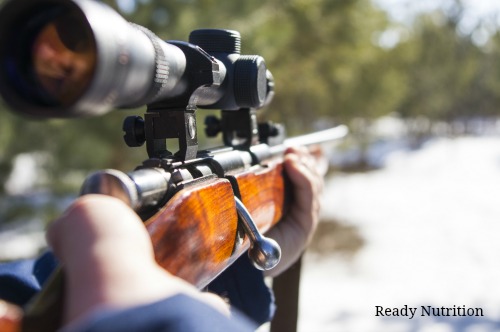
ReadyNutrition Readers, this is kind of a sensitive subject: hunting for food. The article is designed to help those who either actively hunt and/or for those who would hunt if it was necessary to survive. Part of pioneer spirit and resourcefulness is to consider all avenues to a thing to succeed, and our forefathers certainly hunted for their food. Even though many of the colonists were farmers and ranchers, game was hunted to provide for their tables.
I do want to give you my own personal viewpoints on hunting, as simple as they are:
- I do not “trophy” hunt: it’s only for meat, and only when my freezer is about emptied.
- I use the whole animal: as much of it as I can, without wasting any of it…I don’t feel I have the right to waste any of it.
- I hunt for food and do not derive any pleasure or satisfaction whatsoever in killing the animal I’ve hunted.
- I am 100% responsible for the safety of those around me when I hunt: those who I see and those who I do not see…who may be within the range of my firearm?
- Every bullet that leaves the muzzle is placed exactly where I want it, and it must be that way – no exceptions. Read more about the 10 commandments of handling firearms.
Setting Hunting Objectives and Standards
These things being mentioned, it is important to define for yourself objectives and goals, as well as standards prior to your hunting excursions. What game are you hunting? Ground-dwelling animals, or birds, and if the latter, are they waterfowl? These considerations are important for your selection of a firearm, as well as the technique you will employ when using it. If you haven’t hunted before, you’ll find there’s a lot more to it than you imagined. Hunting is not a “singular” skill but blends many different skills in the pursuit of an objective.
You must learn to identify tracks and how to track (there’s a difference). You must learn how to forecast weather and how to hunt with in it. You need some basics on ballistics and firearms, and when you finally arrive on a selection of your firearm? You must know it akin to the back of your hand: everything about that rifle relevant to function, cleaning, and positive/negative factors needs to be known by you.
You must learn first aid: for yourself and others. Remember: it is not just a matter of you shooting someone by mistake, may God forbid it. You may be stalking a deer in the brush and slip on rocks, hurting yourself badly. Then it morphs from a simple hunting excursion into a grim battle for survival. You must know how to dress out, cure, skin, and butcher the game that you shoot.
Two guys who had never hunted went out and bagged a deer. They dragged the deer by the hind legs, and the antlers were getting caught in the underbrush. After about a half a mile of this, one said, “Hey, why don’t we pull him from the other side?” The two men nodded at one another and commenced to drag the deer by the antlers. The second man said, “Yeah, good idea. Dragging him this way is a lot easier.” The first man said, “Yeah, it is, but…we’re getting further and further away from the car!”
This is homesteading. This is survival.
You must know the habits and ways of the animals or birds you’re hunting. There are a lot of big advantages to hunting that are mutually beneficial to the hunter and the environment. During the wintertime, many deer (especially here in Montana) have a terrible time with browsing and foraging for food, and many do indeed starve to death. The population of deer is not in a decline. Hunting does “thin out” the herds and enable the animals to have more resources than if the herds were to be left unchecked.
The forestry service does (at least here in Montana) a tremendous amount in terms of conservation. The whole thing is more than just “hunter and hunted,” but is an actual symbiosis where (with the proper checks and balances) humans can secure more than enough meat to eat, at the same time keeping the herds from growing unmanaged. If you know anything about deer, you know that in the spring when you’ve planted your garden that they will eat it all up as soon as the shoots poke out of the ground.
When you hunt, you can secure a large quantity of meat to throw some in the freezer, to smoke some of it, and to home-can the rest. This is prepping. This is homesteading. This is survival. There is a way to maintain a balance with nature: the respect for the animal and the utilization of all that he has, for the purpose of eliminating/reducing any waste. This is conservation, because you and your family have the right to provide for yourselves, as well. Read Eric Schlosser’s “Fast Food Nation” to remove any obstacles of thought that may allow a person to feel “cleaner” or “better” when they’re munching on that Double Quarter Pounder with extra cheese, extra onion. The book, not the movie; the movie was nothing compared to the book.
Hunting is not a step backward: it is a big step back toward reclaiming the heritage that is ours – yours and mine – of when Americans were not only socially conscious but self-sufficient. Soon we will cover some different types of firearms and recommend certain calibers and models for different types of game. Until then, do some research and homework on what types of game you have in your area, and how you would plan on hunting it for your table and your supplies. Be safe, take care of one another, and keep up the good fight! JJ out!
This article was originally published at Ready Nutrition™ on December 9th, 2016






